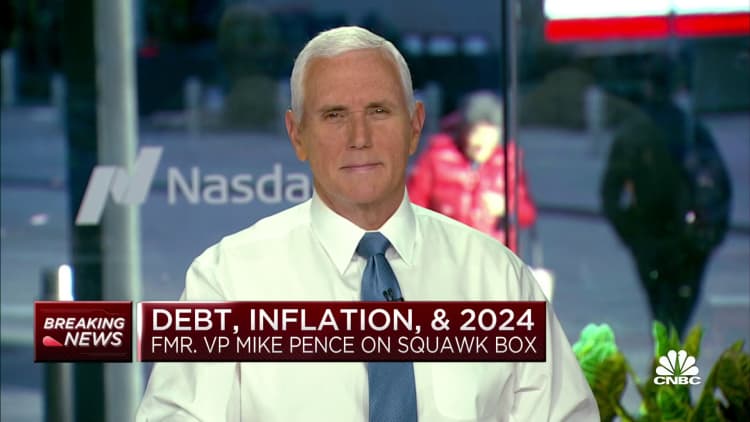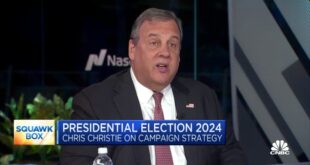
Former Vice President Mike Pence’s White House bid could highlight a clash over Social Security and Medicare that some of his Republican competitors, including Florida Gov. Ron DeSantis, have been keeping at arm’s length.
Pence, who kicked off his campaign Wednesday, has set himself apart from most of the GOP primary field by talking about entitlement reform, often called the third rail of American politics.
“The biggest drivers of runaway spending are our New Deal and Great Society programs upon which Americans depend every day, Social Security and Medicare,” Pence said in his presidential announcement speech.
If left unaddressed, the programs’ burdens will “crush the future” for the next generation, he argued.
His stance puts him directly at odds with former President Donald Trump, who has roundly rejected any cuts to the two programs and has whaled on DeSantis over his past support for restructuring proposals. Trump and President Joe Biden have both attacked DeSantis from the same angle.
DeSantis has since reversed himself, assuring in recent months that Republicans are “not going to mess with Social Security.” And his presidential campaign has spent little time dwelling on the issue — perhaps unsurprising, given that a pro-Trump pollster reportedly found DeSantis’ record on entitlement cuts is his most vulnerable position with swing state voters.
Biden’s “policy is insolvency,” Pence said, but “you deserve to know, my fellow Republicans, that Donald Trump’s position on entitlement reform is the same. Both of them refuse to even talk about the issue and take it to the American people.”
The Trump effect
The gulf between the presidential front-runners and more traditionally conservative figures like Pence, Trump’s former top ally who faces long odds for the White House, reflects a broader retreat from a position that was once central to the GOP’s message of fiscal responsibility.
Some experts trace that inflection point back to Trump’s political ascent.
“The Republican Party had a lot of positions that were the positions of conservative Ph.D. economists — lower taxes, lower entitlements, more trade, etc.,” said Steven Teles, a professor of political science at Johns Hopkins University and senior fellow at the Niskanen Center, in an interview. “Trump had no commitment to any of that framework at all.”
Trump realized “he could just tell people what they wanted to hear, and nobody had actually tried that in the Republican Party,” Teles said.
Trump himself had once called for raising the Social Security retirement age to 70 — but he abandoned that view by the time he was a presidential candidate in 2015.
Former US President and 2024 Presidential hopeful Donald Trump smiles during a Team Trump Volunteer Leadership Training at the Grimes Community Center in Grimes, Iowa, on June 1, 2023.
Andrew Caballero-reynolds | AFP | Getty Images
“We’re going to save it without increases,” Trump said at the time. “We’re not going to raise the age and it will be just fine.”
If Trump was making a political calculation, it wasn’t a difficult one.
Tens of millions of U.S. seniors depend on Social Security and Medicare benefits, and that number is growing as the population ages. In turn, the share of registered voters over 50 has surged in recent decades. Older voters tend to turn out at higher rates than younger groups, and they also tend to skew more heavily Republican.
Strong majorities of U.S. adults across the political spectrum consistently say they oppose cutting Medicare and Social Security benefits. They also oppose some of the ideas put forward to reform the programs, such as raising the age of eligibility, reducing the size of Social Security payments or raising Medicare premiums.
But both programs are set to run dry in the coming years, as the growing pool of benefits-eligible seniors eclipses the shrinking workforce funding them through their payroll taxes.
The Social Security administration’s excess reserves as a whole are currently on track to be depleted starting in 2034, while Medicare’s Hospital Insurance trust fund is projected to be unable to pay full benefits by 2031.
Internal battles
Some Republicans, including a handful vying for the presidency, have continued to call for entitlement reforms as they warn of a looming insolvency crisis. But many others, including party leaders, have bristled at accusations that the GOP wants to gut Social Security and Medicare.
Republicans loudly booed when Biden, in his most recent State of the Union address, accused some of them of seeking to sunset the two programs. It was an apparent reference to a plan put out last year by Sen. Rick Scott, then the chair of Republicans’ Senate campaign committee, that included the line, “All federal legislation sunsets in five years. If a law is worth keeping, Congress can pass it again.”
But Senate Minority Leader Mitch McConnell, R-Ky., had disavowed Scott’s plan, saying that a proposal to sunset the programs “will not be part of the Republican Senate majority agenda.”
U.S. House Speaker Kevin McCarthy (R-CA) speaks during a press conference accompanied by House Majority Leader Steve Scalise (R-LA) and U.S. Rep. Elise Stefanik (R-NY) after the House approved the debt ceiling deal he negotiated with the White House to end their standoff and avoid a historic default, at the U.S. Capitol in Washington, U.S. May 31, 2023.
Jonathan Ernst | Reuters
And House Speaker Kevin McCarthy, R-Calif., had drawn a red line around the programs as part of a recent political fight over the debt ceiling.
Critics, including the White House, have said that vague Republican proposals to “strengthen” entitlements would actually lead to damaging cuts. Biden press aide Andrew Bates in a memo Wednesday accused Republicans of taking “direct aim” at the programs, pointing to McCarthy’s recent calls for a congressional commission to look for cuts across the government — including mandatory spending programs such as Medicare and Social Security.
Meanwhile, Trump, still a driving force in the GOP, warned Republican lawmakers not to “cut a single penny from Medicare or Social Security” as part of the debt ceiling fight.
The mainstream Republican view on entitlements was once more clear. A 2011 budget proposal championed by then-House Budget Chairman Paul Ryan, R-Wis., made reforming Medicare a top priority. That plan would move toward privatizing the program by giving seniors subsidies to shop for private coverage.
The following year, Ryan was picked as Mitt Romney’s running mate for his 2012 presidential bid against then-President Barack Obama. In 2015, Ryan was elected speaker of the House.
DeSantis’ views
DeSantis spoke approvingly of Ryan’s ideas while running for Congress in 2012.
“What I think we need to do for people in my generation particularly is start to restructure the program in a way that’s going to be financially sustainable, both Social Security and Medicare,” DeSantis said in a 2012 interview.
“I would embrace proposals, you know, like Paul Ryan offered and other people have offered that are going to provide some market forces in there and more consumer choice and make it so that it’s not just basically a system that’s going to be bankrupt when you have new people coming into it,” DeSantis said.
“Social Security, I would do the same thing,” he added.
Once in Congress, DeSantis voted for nonbinding conservative budget proposals to reform entitlements.
But in the lead-up to his White House bid, DeSantis has taken a different tack.
Fireside chat with Gov. Ron DeSantis and First Lady Casey DeSantis as part of the Our Great American Comeback campaign event in Lexington, SC, on June 02, 2023.
Peter Zay | Anadolu Agency | Getty Images
“I have more seniors [in Florida] than just about anyone as a percentage. You know, we’re not going to mess with Social Security as Republicans,” DeSantis said on Fox News in March, responding to Biden’s claims that Republicans supported cuts.
“I think that that’s pretty clear,” DeSantis added, before moving the discussion away from entitlements and arguing that discretionary spending — money that Congress must vote to appropriate each year — was driving inflation.
As a presidential candidate, DeSantis has vowed to rein in profligate government spending. But his campaign website makes no mention of Social Security and Medicare — which accounted for nearly 8% of GDP in 2022 — and he hasn’t brought the issue up unprompted.
DeSantis announced his campaign in a lengthy, free-form conversation with Twitter chief Elon Musk that addressed a broad range of social issues and other policy topics, but did not touch on entitlements.
In a subsequent Fox interview, DeSantis avoided a direct discussion of Medicare and Social Security, even when asked twice for his views on how he would address those programs.
Asked on Fox if deficit spending can be solved without addressing entitlements, DeSantis said, “Of course, the overspending is driving inflation,” before turning to the Federal Reserve.
Pressed to answer whether he believed the budget can be balanced without touching mandatory spending, DeSantis said, “Well, it’s true. You know, the math I mean, at the end of the day, we’re spending so much more. And it’s a combination of both” discretionary and mandatory spending.
The DeSantis campaign pointed CNBC to three other recent interviews where the topic had come up. Asked about the country’s finances in an interview with libertarian John Stossel, DeSantis emphasized the increase in discretionary spending over mandatory spending.
In an interview with Newsmax, DeSantis had been asked to respond to criticism from Trump’s allies DeSantis’ record on entitlement reform.
“Those are Democrat attacks,” DeSantis said. “I don’t think anyone really buys that.”
 EU News Digest Latest News & Updates
EU News Digest Latest News & Updates



